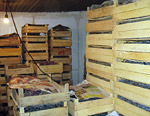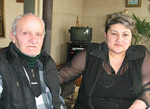Sour Grapes: No Buyers for Verin Artashat’s 430 Vineyard Crop
 Farmers can’t pay off loans when 3,500 tons of grapes remain in refrigerators
Everyone in the village of Verin Artashat, in Ararat Marz, is unhappy about their lot in life. Almost all have put their homes and land up as collateral for loans.
“There’s absolutely no one who cares about the villager. The government sees us as if we are lost children, to be neglected,” says Arous Shahoyan, who owns a 4,900 meter vineyard in the village.
Mrs. Shahoyan has been forced to take out loans from the “Finka” and “Aregak” credit agencies to make a go of his farm. He took out a $2,500 loan from “Finka” and has already paid back 1.8 million AMD on the “Aregak” loan. He has 600,000 left to pay on the latter.
Creditors demand AMD in payment
Her vineyard is still on the books as collateral. “We arranged the loan with “Finka” in dollars but they have demanded Armenian drams as payment. They check the rates each time. They demand drams even though the contract specified dollars. Hey, they make the rules as they go and the poor villager must comply,” said Mrs. Shahoyan.
But grape growers like Mrs. Shahoyan haven’t been able to sell their last harvest and thus can’t make the loan payments. Mrs. Shahoyan has stored his unsold grapes in boxes in a refrigerated case hoping for the day when he can sell them. Out of 500 crates of grapes, he has only been able to sell off 100.
Local farmers say they had a good crop last season but that the large firms only bought from those growers with whom they had contracts. Those with no contract waited for Georgian buyers but they never came.
Arous Shahoyan was one of the unlucky ones; he had no contract with the plants. “Since we didn’t have any contract, we couldn’t sell our grapes. We couldn’t even get a foot in the door of the factory,” he said.
Buyers pay less than crop is worth
Farmers from Verin Artashat argue that even those who did sell to the factories came out with a loss since they only got 80 drams for one kilo of grapes worth 104 drams.
“The whole village has debts for insecticides. At least those selling the insecticides had enough of a conscience to let us have the stuff on credit in order to use in a timely fashion. I won’t even tell you about the debts we owe for land rents. Now they tell us either pay up or we’ll take you to court. Where can the poor farmer get the money to pay? We’re even ashamed to go to the village mayor for help. Why must we be placed in such a bind? Why can’t we sell our grapes in order to pay off our loans?” added Mrs. Shahoyan.
She’s afraid that he won’t be able to make the loan payments and that the credit agency will seize his vineyard. “Finka” also made an inventory of the household goods and the woman is scared that they’ll repo them as well.
Farmers demand solution from government
“Our government must sit down and think this matter through intelligently. They must devise a plan for our grapes to be sold because we survive on our grape crop. We have no other income. At least they should grant us a few years leeway with the loan payments. Insecticides have also gone up in price,” Mrs. Shahoyan said.
The farmer adds that those with refrigeration units are running them 24 hours a day and the utility bills are skyrocketing. “We use sulphur to preserve the grapes and our health is being damaged. Our lungs are shot and you know that sulfur is a carcinogen. It’s essential that the government come up with a solution and fast because we farmers are swamped,” Mrs. Shahoyan said.
Mrs. Shahoyan works at the Yerevan Emergency Unit and receives a monthly salary of 35,000 AMD ($90). She complained to us about her pitifully low salary and the fact that she has to care for two ailing pensioners whose monthly prescriptions cost 100,000 AMD.
Farmers can’t pay off loans when 3,500 tons of grapes remain in refrigerators
Everyone in the village of Verin Artashat, in Ararat Marz, is unhappy about their lot in life. Almost all have put their homes and land up as collateral for loans.
“There’s absolutely no one who cares about the villager. The government sees us as if we are lost children, to be neglected,” says Arous Shahoyan, who owns a 4,900 meter vineyard in the village.
Mrs. Shahoyan has been forced to take out loans from the “Finka” and “Aregak” credit agencies to make a go of his farm. He took out a $2,500 loan from “Finka” and has already paid back 1.8 million AMD on the “Aregak” loan. He has 600,000 left to pay on the latter.
Creditors demand AMD in payment
Her vineyard is still on the books as collateral. “We arranged the loan with “Finka” in dollars but they have demanded Armenian drams as payment. They check the rates each time. They demand drams even though the contract specified dollars. Hey, they make the rules as they go and the poor villager must comply,” said Mrs. Shahoyan.
But grape growers like Mrs. Shahoyan haven’t been able to sell their last harvest and thus can’t make the loan payments. Mrs. Shahoyan has stored his unsold grapes in boxes in a refrigerated case hoping for the day when he can sell them. Out of 500 crates of grapes, he has only been able to sell off 100.
Local farmers say they had a good crop last season but that the large firms only bought from those growers with whom they had contracts. Those with no contract waited for Georgian buyers but they never came.
Arous Shahoyan was one of the unlucky ones; he had no contract with the plants. “Since we didn’t have any contract, we couldn’t sell our grapes. We couldn’t even get a foot in the door of the factory,” he said.
Buyers pay less than crop is worth
Farmers from Verin Artashat argue that even those who did sell to the factories came out with a loss since they only got 80 drams for one kilo of grapes worth 104 drams.
“The whole village has debts for insecticides. At least those selling the insecticides had enough of a conscience to let us have the stuff on credit in order to use in a timely fashion. I won’t even tell you about the debts we owe for land rents. Now they tell us either pay up or we’ll take you to court. Where can the poor farmer get the money to pay? We’re even ashamed to go to the village mayor for help. Why must we be placed in such a bind? Why can’t we sell our grapes in order to pay off our loans?” added Mrs. Shahoyan.
She’s afraid that he won’t be able to make the loan payments and that the credit agency will seize his vineyard. “Finka” also made an inventory of the household goods and the woman is scared that they’ll repo them as well.
Farmers demand solution from government
“Our government must sit down and think this matter through intelligently. They must devise a plan for our grapes to be sold because we survive on our grape crop. We have no other income. At least they should grant us a few years leeway with the loan payments. Insecticides have also gone up in price,” Mrs. Shahoyan said.
The farmer adds that those with refrigeration units are running them 24 hours a day and the utility bills are skyrocketing. “We use sulphur to preserve the grapes and our health is being damaged. Our lungs are shot and you know that sulfur is a carcinogen. It’s essential that the government come up with a solution and fast because we farmers are swamped,” Mrs. Shahoyan said.
Mrs. Shahoyan works at the Yerevan Emergency Unit and receives a monthly salary of 35,000 AMD ($90). She complained to us about her pitifully low salary and the fact that she has to care for two ailing pensioners whose monthly prescriptions cost 100,000 AMD.
 “They receive pensions just a bit above 40,000. That doesn’t even cover the medical bills. My father can’t even get a needed eye operation because he doesn’t have the proper paperwork to get on the government assisted medical waiting list. Each operation costs 220,000 AMD,” Mrs. Shahoyan said.
Who can afford this medicine?
During our conversation, her father, Misha Shahoyan, showed us a small drug vial that cost 2,000 AMD. “Can I afford such medicine on a regular basis given the pension I get? My sight is already on the wane,” said the elderly man.
He says that the family has stopped using gas and now burns wood to heat the home. The gas bill was too much for them. They pointed to the apricot trees in the garden that they chop down for fuel.
“They receive pensions just a bit above 40,000. That doesn’t even cover the medical bills. My father can’t even get a needed eye operation because he doesn’t have the proper paperwork to get on the government assisted medical waiting list. Each operation costs 220,000 AMD,” Mrs. Shahoyan said.
Who can afford this medicine?
During our conversation, her father, Misha Shahoyan, showed us a small drug vial that cost 2,000 AMD. “Can I afford such medicine on a regular basis given the pension I get? My sight is already on the wane,” said the elderly man.
He says that the family has stopped using gas and now burns wood to heat the home. The gas bill was too much for them. They pointed to the apricot trees in the garden that they chop down for fuel.
 Ashot Ghazaryan, the Mayor of Verin Artashat, told us that the general welfare of the village wasn’t all that bad and that most residents lived comfortably, if not in luxury. He agreed that there was a problem selling the grape harvest. There are 430 vineyards in the village.
“In past years, the Georgians would come and buy up the grapes. The border was wide open. Now they tell us that the Georgian government has banned grape imports from outside. It’s a huge problem. We have 3,500 tons of grapes in refrigeration and it’s possible they’ll just go to waste,” said Mayor Ghazaryan.
The mayor assured us that he had contacted the proper authorities the day the grapes were harvested but that the problem remains unresolved.
Ashot Ghazaryan, the Mayor of Verin Artashat, told us that the general welfare of the village wasn’t all that bad and that most residents lived comfortably, if not in luxury. He agreed that there was a problem selling the grape harvest. There are 430 vineyards in the village.
“In past years, the Georgians would come and buy up the grapes. The border was wide open. Now they tell us that the Georgian government has banned grape imports from outside. It’s a huge problem. We have 3,500 tons of grapes in refrigeration and it’s possible they’ll just go to waste,” said Mayor Ghazaryan.
The mayor assured us that he had contacted the proper authorities the day the grapes were harvested but that the problem remains unresolved.
If you found a typo you can notify us by selecting the text area and pressing CTRL+Enter
 Videos
Videos Photos
Photos
Write a comment